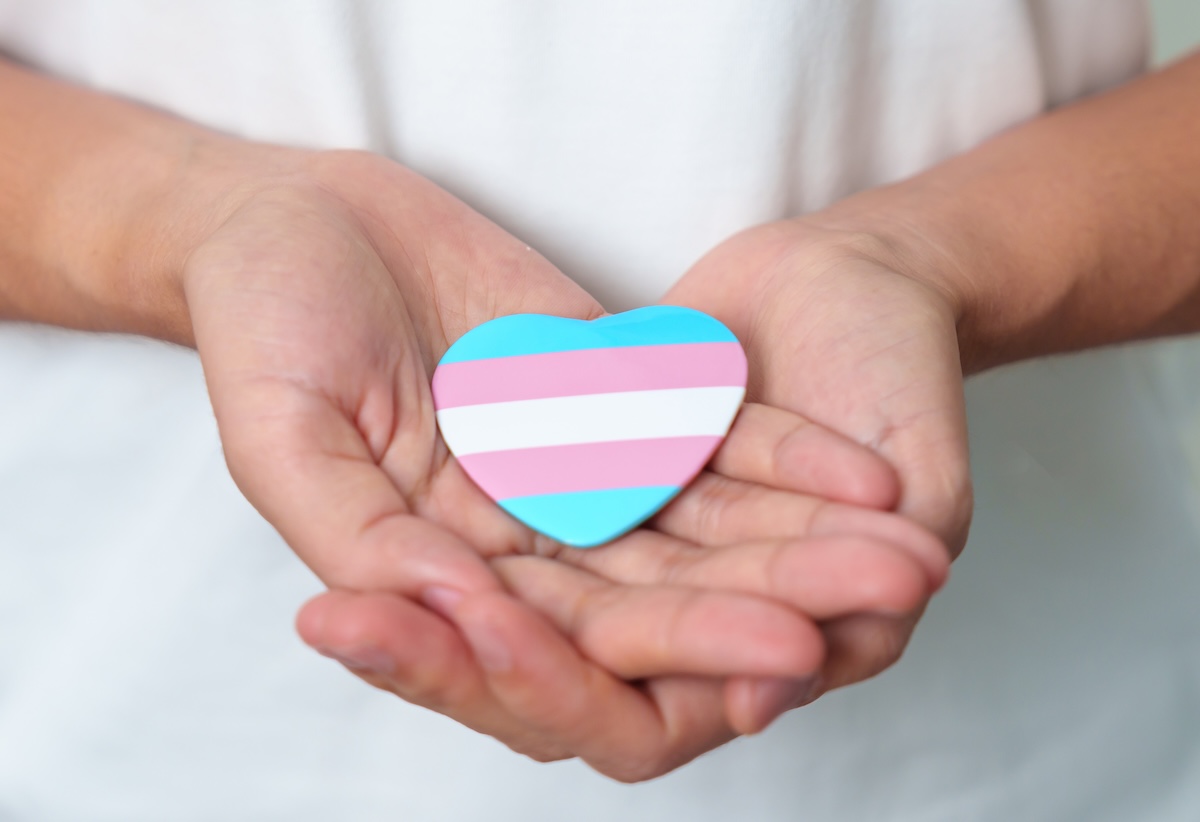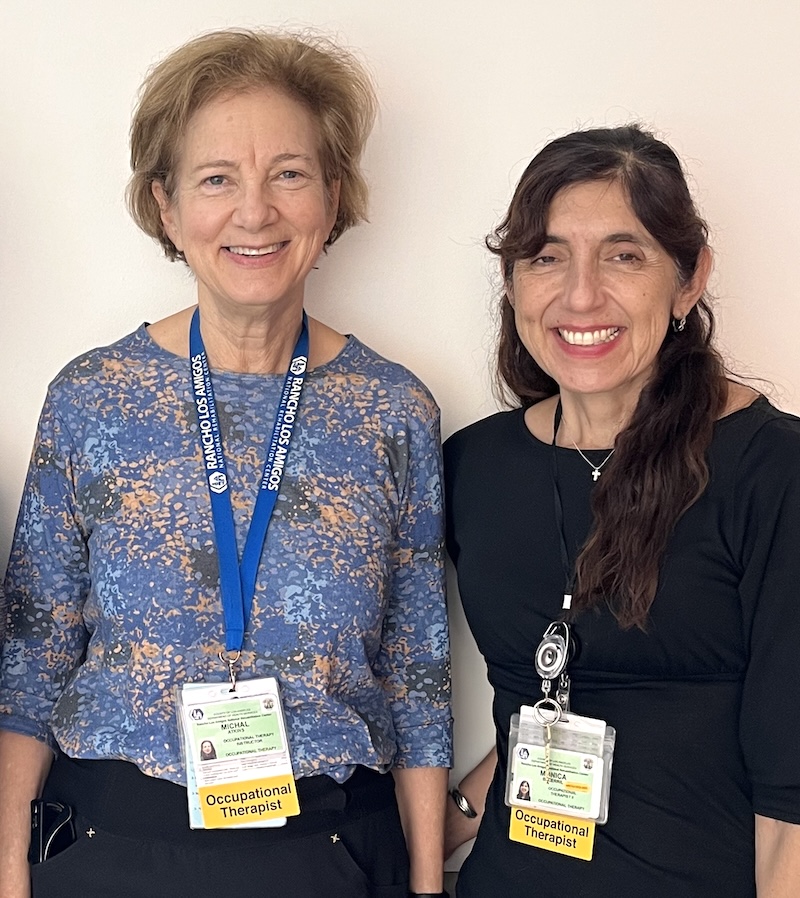Latest in Lifestyle Redesign®
November 2024
Transgender Awareness Week: November 13-19th
November 13 through 19th is an annual observation of Transgender Awareness Week, a dedicated time to increase visibility and understanding of the challenges transgender individuals encounter related to their gender identity and transition processes.
By raising awareness and advocating for inclusive practices, we are working toward a future where all transgender individuals receive comprehensive care and support.
This month’s Latest in Lifestyle Redesign newsletter will highlight the transgender community experiences through the lens of occupational therapy, where research is still limited.
LR IRL — Lifestyle Redesign in Real Life
As a cisgender woman, Dr. Nora Dixon approaches her work with awareness of her own positionality and the privilege that comes with it. She acknowledges that there are limits to her understanding without lived experience of being transgender.
Reclaiming the Self

After undergoing top surgery — a step toward affirming their gender identity — El faced an unexpected complication. During the surgery, cancerous tissue was discovered in their chest, requiring a full tissue removal. The results left El with a chest that felt unfamiliar, now shaped by the extensive removal, and a prominent scar that stirred intense feelings of discomfort. El described their appearance as a “concave chest with a convex belly”. When El met with Dr. Nora Dixon, an occupational therapist (OT) at the Occupational Therapy Faculty Practice, El felt self-conscious and was protective of the scar that served as a physical reminder of the trauma endured.
In their initial sessions, Nora focused on creating a foundation of trust through providing education and promoting El’s self-awareness. Together, they explored the connection between El’s feelings of dysphoria1 and their mental health, including anxiety and depression. Through guided self-analysis, Nora encouraged El to identify how these emotional and physical challenges were impacting their daily life. Their sessions together became a safe space for El to recognize and track patterns that intensified their dysphoria, such as workplace burnout and interpersonal stress, and to develop strategies for sustainable self-regulation.
For El, the path toward healing was also one of processing difficult realizations. The surgery had not only changed their body but had also strained certain relationships; some friends consistently misgendered El, while others failed to show up for them during this vulnerable time, leaving El feeling emotionally isolated. Anxiety, dysphoria, and a protective posture around their scar made reintegration into the community especially challenging. With Nora’s support, El began to confront these interpersonal challenges by advocating for correct pronoun use and delegating some of that advocacy to their strongest allies, so as to reduce the burden of having to constantly correct others. At the same time, they engaged in context analysis to explore environments that were safest to re-enter, such as familiar spaces with trusted friends or predictable settings like the movie theater with assigned seating. These steps empowered El to honor their own boundaries and prioritize affirming relationships but also laid the foundation for them to return to meaningful routines.
As their sessions together progressed, Nora introduced sensory-based coping strategies and mind-body techniques to support El’s emotional regulation. Together, they explored the RAIN framework — Recognize, Allow, Investigate, Nurture — as a way to address the complex emotions El was experiencing. Through journaling and mindful self-reflection, El began to confront core beliefs they held about their self-worth and self-protective behaviors. In doing so, El began to reconnect with their passions and incorporate gender-euphoric2 behaviors, such as looking in the mirror during Pilates while posing with arms elongated and an open chest; this pose evoked an overwhelming sense of joy and pride in their body for the first time since surgery. El’s proud posture reflected a new sense of weightlessness in their chest, allowing them to fully engage in movement and express themselves through dance, another passion of theirs, and re-engage in an occupation that elicited a sense of freedom and affirmation.
By the end of their 11 sessions in OT, El had reclaimed a new sense of agency and confidence, deciding to celebrate their journey by inviting their entire rehab team to attend their first postoperative dance recital. From the crowd, Nora witnessed the manifestation of El’s time in OT; El had moved beyond feeling trapped by helplessness to openly embracing their identity. For El, this chapter in their lives was more than physically healing, but an empowering reclamation of self that set them on a path to continue redefining life on their own terms.
El’s resilience left a profound impact on Nora, who reflected on the value of OT in gender-affirming care:
“Gender-affirming care is life saving. It can be as simple as using the right name and pronouns, and treating the client for whatever they’re there for, or it can be as complex as diving into the routines that affirm someone’s gender identity…There’s tons of research on the medical and surgical components of transitioning, but not much around the social side of the transition. No other profession is going to spend an hour talking about those things…No one has our lens, activity analysis and our focus on routines. It’s underutilized and under-researched, but at the same time it’s really exciting and necessary.”
1Gender dysphoria — an experience of unease or discomfort around one’s gender, body, or how one is being perceived by those around them. It’s important to note that note all trans folks experience this.
2Gender euphoria — an experience of joy, alignment, or excitement around one’s gender, body, or how one is being perceived by those around them.
Definitions above are from TransHub.org.au, a digital information and resource platform with resources for transgender people, allies, and healthcare providers. Additional resources on transgender health can be found at World Professional Association for Transgender Health (WPATH).
Research Spotlight
Working With Lesbian, Gay, Bisexual, and Transgender Clients: Occupational Therapy Practitioners’ Knowledge, Skills, and Attitudes (2022)

Ensuring optimal healthcare for the LGBT community involves understanding and addressing the unique challenges faced by this group. LGBT individuals often experience discrimination, stigma, and a lack of informed care, which can lead to health disparities and barriers to accessing services. To meet the unique needs of LGBT patients, healthcare providers require education and an empathetic approach; continuous education, inclusive policies, and an open-minded attitude are essential in creating a healthcare environment where every individual feels respected and understood.
Practitioners’ knowledge, preparedness, and attitudes about working with clients who identify as LGBTQ+ are influenced by education, experience, and personal relationships. In a national survey of 589 occupational therapists, those with higher levels of education, LGBT-specific training, and personal connections with LGBT individuals reported greater confidence and competence in providing care. Findings showed higher religiosity was associated with lower scores on knowledge and attitudinal awareness subscales, which focuses on the complex overlap between an OT’s own personal factors and the clinical care they provide, while having a close friend or family member who identified as LGBT was associated with higher mean scores. This study highlights some of the complex factors contributing to healthcare disparities and underscores the critical need for ongoing education and implementing inclusive practices within occupational therapy.
*Accessing full article requires AOTA membership.
Life Satisfaction and Gender Congruence in Transgender Individuals: A Role for Occupational Therapy (2024)

Healthcare is a fundamental right, yet diverse populations, such as the transgender community, often face unique challenges that stem from discrimination, lack of understanding, and insufficient access to tailored healthcare services. Occupational therapy has the capacity to significantly enhance the quality of life for transgender individuals; the profession’s holistic approach to healthcare can help patients achieve a sense of well-being and fulfillment in their personal and social lives.
A study led by a team at Creighton University, conducted a cross-sectional survey that explores life satisfaction and gender congruence in transgender individuals using the Gender Congruence and Life Satisfaction and World Health Organization Quality of Life-BREF. Findings reveal that societal restrictions do significantly impact transgender individuals’ ability to engage in occupations that align with their internal gender identity. This misalignment contributed to lower life satisfaction scores across physical, psychological, social, and environmental domains. The authors emphasize the critical role of occupational therapy in supporting gender transition and affirming gender identity through customized interventions that affirm patients’ gender identity, such as developing self-care routines that enhance gender congruence. Given the small sample size and limited generalizability, future research is needed to explore the specific benefits of occupational therapy interventions for transgender individuals. This study emphasizes that there is a need for the field of occupational therapy to expand to contribute to the well-being of transgender individuals.
Author Dr. Andrea Fleischman shared:
“Transgender individuals endure significant discrimination and oppression, which ultimately impacts their ability to live authentically and engage in occupations that are congruent with their gender identity. The transgender community should be given the same opportunities that all others have to be true to themselves without fear. As occupational therapists we have the unique skill set and holistic approach to address the concerns and facilitate occupational justice”.
*Access to full article may be restricted to institution subscription or AOTF membership.
Upcoming Opportunities
12 Years of Lifestyle Redesign® at Rancho Los Amigos National Rehabilitation Medical Center
Webinar | Thursday, December 19, 2024

Michal Atkins and Monica Becerril
Join this webinar to learn about how occupational therapists at Rancho Los Amigos National Rehabilitation Medical Center are applying Lifestyle Redesign in an outpatient neurologic condition-focused setting and how this program is unique from other outpatient programs. The speakers will highlight lessons learned, challenges, and successes over 12 years of program development and expansion for clients with neurological disabilities in a safety net setting. The webinar will provide insight into how the speakers tailor their care to meet the needs of a predominantly low socioeconomic status, Latinx/é population, including overcoming language and literacy barriers, food and housing insecurity, lack of community participation, and limited health literacy.
Date: Thursday, December 19, 2024
Time: 11am–12pm Pacific Time
Location: Zoom
Audience: This is an introductory level activity designed for OT practitioners, however, all levels of experience and disciplines are welcome.
Cost: This webinar is offered at no cost. Registration is required.
CEUs: 1 contact hour (0.1 CEU)
About the Speakers: Michal S. Atkins & Monica Becerril
Empowering Change: A Training for Occupational Therapy Practitioners in Motivational Interviewing
Interactive Course | December 13, 2024 through December 15, 2024

Motivational interviewing (MI) is an effective approach to overcoming the ambivalence that keeps many people from making desired changes in their lives. Occupational therapy practitioners and other healthcare professionals will find this method of therapeutic communication to be an effective tool to both understand the nature of behavior change and to develop the skills to identify readiness for change; and, ultimately, to facilitate the process.
This is a live, interactive course in which participants will apply MI principles through role-playing. This is designed to be a supportive learning environment where participants will be actively engaged in practicing MI skills. While this course is designed to be applied to OT practice, the content covered can be applicable to any population; therefore, all disciplines are welcome.
This is a 12-hour course held across 3 days (4 hours per day). Participants are expected to fully participate for the entire course.
Dates/Times (Pacific Time):
- Friday, December 13, 2024, 1–5pm
- Saturday, December 14, 2024, 8am–12pm
- Sunday, December 15, 2024, 8am–12pm
Location: Zoom
Cost:
- Standard: US$250
- AOTA Members and USC Chan Alumni: $225
CEUs: 12 contact hours (1.2 CEU)
Note: This course satisfies the 12-hour MI training requirement for obtaining Lifestyle Redesign Certification.
OT Faculty Practice Mental Health Fellowship: Pathway for Lifestyle Redesign Certification

The USC Occupational Therapy Faculty Practice (OTFP) offers a fellowship program to provide Lifestyle Redesign training opportunities to licensed occupational therapy practitioners. The purpose of the USC OTFP Fellowship program is to foster the development of expertise in administering the Lifestyle Redesign intervention to individuals living with chronic physical and mental health conditions.
The fellowship curriculum will include more than 1,400 hours of didactic and clinical education, mentored service delivery and non-mentored service delivery and will cover topics including pathophysiology of chronic conditions, occupation-based and evidence-based practice guidelines, safety regulation and ethical practice guidelines, interpersonal skills, and professional engagement. Fellows will be paired with a faculty clinician and will engage in training, structured mentoring sessions and scholarly activities to enhance their clinical practice and leadership skills. Throughout the experience, fellows will work on interprofessional teams, engage in public speaking, and participate in community engagement activities. The fellowship will expedite the process of meeting requirements for the Lifestyle Redesign certification, as fellows will complete the didactic content and clinical hours needed to apply for Lifestyle Redesign certification.
Applications will open in January 2025 with a start date of Summer 2025. For additional information, please contact the Fellowship Coordinator, Lindsey Shomer, at lindsey.shomer@med.usc.edu.
The fellowship program is currently in candidacy status with the American Occupational Therapy Association. See additional information about the OT Faculty Practice and current programs.
On-Demand Learning Opportunities

The Lifestyle Redesign Webinar Series events are recorded and made available for on-demand viewing shortly thereafter, for a nominal fee. Upon purchasing access to the on-demand webinar, there is a 30-day window to view the webinar recording and submit post-webinar surveys to receive continuing education credit.
CEUs: 1 contact hour (0.1 CEU)
Cost:
- Standard: $30
- AOTA Members & USC Chan Alumni: $27
For more information about this on-demand webinar or general information about accessing on-demand webinars and claiming CEU credit, please visit the On-Demand Learning page.
Certification Section
LRC Info Session
Interested in earning your Lifestyle Redesign Certification? Join us for an information session on Monday, February 3, 2025 @ 3pm PST to learn about the certification process and get your questions answered!
Info sessions are live, online events, hosted via Zoom:
- Topic: Lifestyle Redesign® Certification Information Sessions
- usc.zoom.us/j/94343068918
- Meeting ID: 943 4306 8918
For full Zoom meeting details and future info session dates/times, check out our calendar by visiting the Upcoming Events page. In the meantime, consider checking out the resources on the Certification page.
Course Series Corner
Start Planning Your Path to Certification
Each course in the Foundations of Lifestyle Redesign Course Series is offered once annually, beginning with Core Course 1, which is the prerequisite for all subsequent courses.
The Course Series takes a minimum of 12 months to complete, though, it is not required to complete all courses in this time frame; participants are welcome to enroll in the courses at the frequency that suits them with the understanding that courses must be taken in sequential order.
The next offering of Core Course 1 will start in September 2025. Registration will open in May 2025; sign up to be notified when Core Course 1 registration opens.







